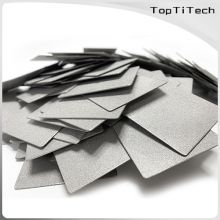Mixed-metal Coated Titanium Anodes for Trivalent Chromium Plating
USD $6 - $15 /Piece
Min.Order:5 Pieces
Quick Details View All >
Baoji Yinggao Metal Materials Co., Ltd.
Product Details
Mixed-metal Coated Titanium Anodes for Trivalent Chromium Plating
Mixed-metal Coated Titanium Anodes for Trivalent Chromium Plating is a material used as an anode in an electrochemical reaction, and it is usually made of pure titanium or a titanium alloy. During the electrochemical reaction, Mixed-metal Coated Titanium Anodes for Trivalent Chromium Plating absorbs electrons and is oxidized, forming an oxide coating on its surface, commonly known as titanium anodic oxide (TAO).
Titanium anodized layer has many useful properties, such as high hardness, excellent corrosion resistance and wear resistance, etc., which makes it widely used in many applications. Among them, the application of coated titanium anode is particularly prominent.
Parameter
Substrate material: titanium Grade 1, titanium Grade 2
Dimensions: customer drawing welcomed
Shape: Plate/Tube/Rod/Mesh shape
MMO coating: Ir-Ta coating
Coating thickness: 0.2-12μm
Temperature: <60 ℃
Working Current: <20000A/m2
Ti Content (%): at least 99%
Technique: plating
Process of Trivalent Chromium Plating
l Preparations: Firstly, titanium anodes and metal workpieces to be electroplated with trivalent chromium need to be prepared. Put the titanium anode and the metal workpiece into the electroplating tank respectively, and add the trivalent chromium electroplating solution into the electroplating tank.
l Start electroplating: Connect the electroplating tank to the power supply and apply current so that the titanium anode becomes the anode and the metal workpiece becomes the cathode. Under the action of electric current, the oxide layer on the surface of the titanium anode will be reduced and dissolved into the electroplating solution, and at the same time, a trivalent chromium oxide layer will begin to form on the surface of the metal workpiece.
l Adjust current and voltage: In order to control the thickness and uniformity of the oxide layer during the electroplating process, it is necessary to adjust the current and voltage according to specific requirements. Generally speaking, the larger the current density, the thinner the oxide layer; the smaller the current density, the thicker the oxide layer. In addition, the temperature and pH value of the plating solution need to be adjusted to ensure the quality and uniformity of the oxide layer.
l Complete electroplating: The electroplating time depends on the thickness and uniformity of the required oxide layer, generally ranging from tens of minutes to several hours. After the electroplating is completed, the metal workpiece is taken out and subsequent processing such as cleaning and drying is carried out to remove the residual electroplating solution and impurities on the surface.
Precautions of Trivalent Chromium Plating
(1) The pH value of the trivalent chromium plating solution should be controlled between 4-5, too high or too low will affect the quality and uniformity of the oxide layer.
(2) The current density should be appropriate. If it is too high, the thickness of the oxide layer will be uneven, and if it is too low, it will affect the plating efficiency.
(3) The trivalent chromium plating solution should be tested and replaced regularly to ensure the quality and stability of the electrolyte.
(4) The electroplating tank and electroplating solution should be cleaned and maintained regularly to avoid the influence of impurities and pollutants in the electroplating solution on the oxide layer.
(5) Safety should be paid attention to during the electroplating process to avoid accidents such as electric shock and chemical splashing into the eyes.
Features
1. Efficiency: Titanium anode has excellent electrochemical properties, which can quickly promote the formation of trivalent chromium oxide layer, thereby improving electroplating efficiency and production efficiency.
2. Cost savings: Compared with traditional electroplating anode materials, such as lead and iron, titanium anodes have a longer service life and lower maintenance costs, which can help companies save costs.
3. Good corrosion resistance: Titanium anode itself has excellent corrosion resistance and oxidation resistance, which can resist the chemical action and corrosive environment in the plating solution, thereby prolonging the service life of the titanium anode.
4. Strong controllability: Titanium anode can control the thickness and uniformity of the oxide layer by adjusting parameters such as current, voltage, electrolyte composition and temperature, so as to obtain the required surface quality and performance.
5. Eco-friendly: Titanium anode itself is an eco-friendly material that will not cause pollution and harm to the environment.
Applications
1. Sewage Treatment;
2. Cathode Protection;
3. Noble Metal Plating (silver, gold);
4. Sea Water Antifouling;
5. Testing Electrode;
6. Electrolytic Synthesis Of Organic;
7. Electroplating Industry;
8. Electrodialysis;
9. Electrolytic Water.
Contact Supplier

You May Like

New Products
Popular Searches
Recommended Products
Find Similar Products By Category